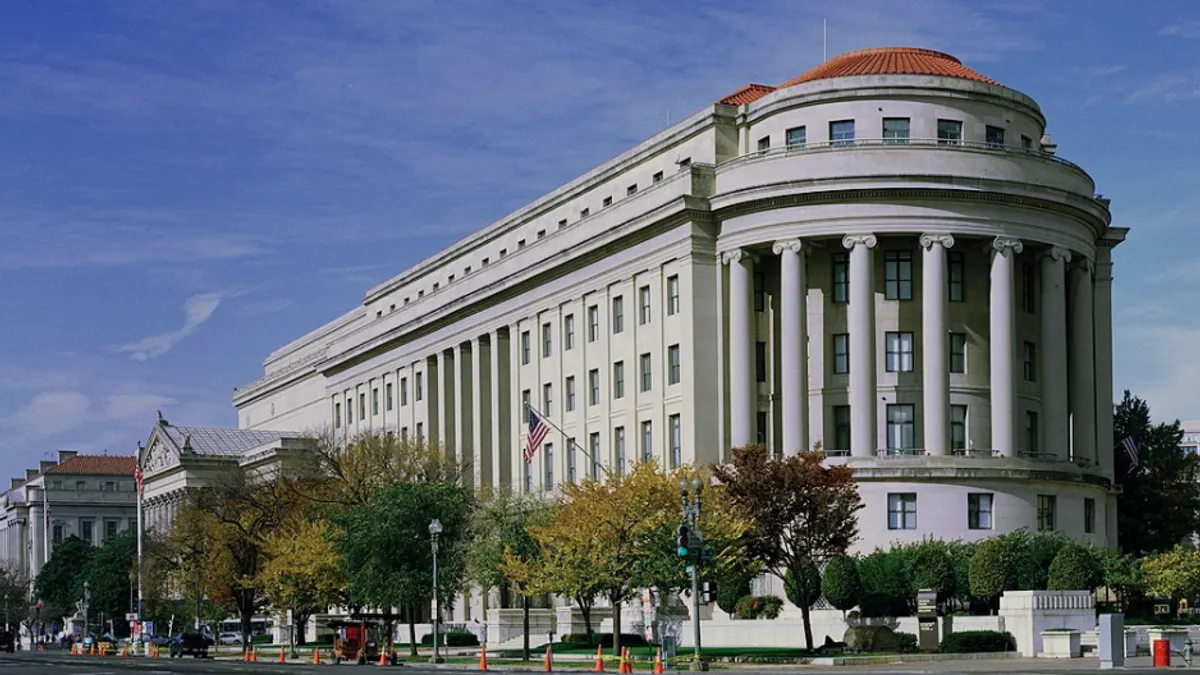Dive Brief:
- With deal-making in the U.S. hitting a record this year, the Federal Trade Commission (FTC) said it cannot keep up with a “surge” in merger filings and complete investigations of deals within the usual 30-day period.
-
“This year the FTC has been hit by a tidal wave of merger filings that is straining the agency’s capacity to rigorously investigate deals ahead of the statutory deadlines,” Holly Vedova, acting director of the commission’s Bureau of Competition, said in a statement. “We believe it is important to be upfront about these capacity constraints.”
- The FTC will notify companies in a form letter if its review will extend beyond 30 days, and emphasize that companies that merge before the end of an investigation would do so “at their own risk,” Vedova said.
Dive Insight:
The value of M&A activity involving U.S. target companies hit a record $1.3 trillion during the first half of 2021, increasing 249% compared with the first six months of last year, according to Refinitiv. U.S. deals accounted for 47% of the $2.8 trillion in worldwide M&A.
Meanwhile, the FTC received 2,067 merger filings from January through July, an “astounding” 138% jump compared with the same period last year, Vedova said.
The surge in filings coincides with intensified antitrust enforcement by the FTC and Justice Department.
President Biden signed an executive order on July 9 calling on the antitrust agencies to “challenge prior bad mergers that past administrations did not previously challenge” and focus enforcement on “labor markets, agricultural markets, healthcare markets (which includes prescription drugs, hospital consolidation, and insurance), and the tech sector.”
Through tougher antitrust enforcement, Biden aims “to promote competition in the American economy, which will lower prices for families, increase wages for workers and promote innovation and even faster economic growth.”
Under the Hart-Scott-Rodino Act, companies planning deals valued at more than $92 million must notify the FTC and Justice Department of transactions in advance. The agencies have 30 days to determine whether to put the deal on hold and require more information.
CFOs generally expect to go ahead with mergers after the 30-day waiting period, and a delayed transaction can erode the appeal of a merger and raise its costs.
The antitrust agencies may determine that a merger is illegal even after a pre-merger review and the completion of a merger.
“When the FTC does not challenge a transaction prior to its consummation, this does not constitute an ‘approval’ or ‘clearance’ of the deal, and the agency maintains the right to challenge a deal regardless of whether it was initially investigated,” Vedova said. “The FTC always has the right to take such further action as the public interest may require.”
Several megadeals — or transactions exceeding $10 billion — fueled the total in U.S. deal-making value during the first half of this year. The deals included the $63.3 billion acquisition of Warner Media by Discovery, the $52.2 billion spin-off of VMware by Dell Technologies and the $33.2 billion acquisition of Kansas City Southern by Canadian National Railway, Refinitiv said.
Deal-making will probably remain robust during the remainder of this year, stoked by several factors including unusually low borrowing costs and a snap-back in economic growth, according to M&A specialists.
“As far as the overall landscape, I don’t see anything that’s going to change dramatically in the next six months,” Matthew Toole, director of deals intelligence at Refinitiv, said in an interview. “The overall conditions that are supporting this amount of M&A and consolidation are here to stay for the rest of this year.”












